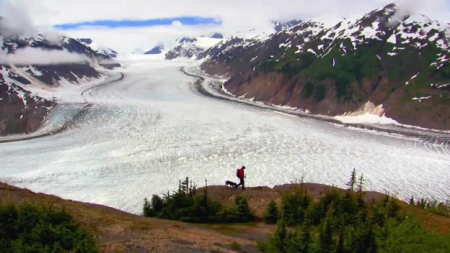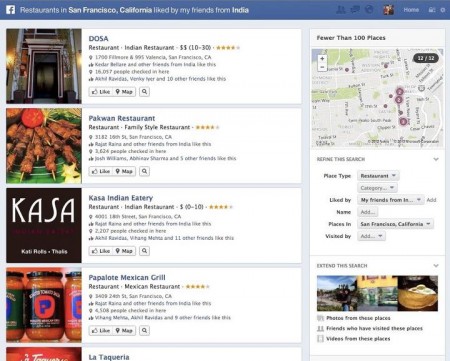The Archives
-
Internet, Marketing, social media, Travel & Tourism
Graph Search is something people might just love
In 2010 I wrote that Tripadvisor’s integration of Facebook connect offered a glimpse into the future. Well the future is here.
Graph Search, announced yesterday by Facebook, is a new way of searching. It’s using taking your social graph and the content shared on Facebook as the basis of relevancy. Graph Search will allow you to search for things based on your personal network of friends, your ‘friends-of-friends’ or Facebook users in general.
You can soon search on Facebook for “restaurants in San Francisco liked by people who live in San Francisco”.
Or “restaurants in San Francisco my friends like”.
Or “restaurants in San Francisco liked by my friends who live in San Francisco.”
Or “Restaurants in San Francisco liked by my friends from India”
The possibilities are endless.
The travel decision process is going to be massively influenced when Facebook users adopt this kind of functionality. Because travel product is a heavy used item on Facebook. People check in, share photos and like places they’ve been all the time.
A whole new world of discovery and travel inspiration might open up. Imagine searching for “Places people check-in who like scuba diving”
Or “Cities people check-in who like art”
Or “festivals people like who like Greenday”
Or “pictures from my friends in Berlin”
Yesterday I also read a nice post by a Techcrunch writer about a recent frustrating trip to the new MySpace. This part caught my attention and made me think.
Wait, how does Myspace know I would like these?Is everyone seeing the same ones? Did Justin pick them out for me? Are my friends listening to these guys? I have no context here. I don’t understand why they’re recommended. I decide to move on.and
I mean really, I logged in with Facebook – would it have killed you to look through my “likes” for a bit of personalization here?A Techcrunch writer is obviously ahead of the curve. But what’s happening here is that people are starting to expect websites to personalize based on their previous behaviour and what they or their friends like on Facebook.
I remember being freaked out when Amazon recommended me books based on my previous purchases. Or when a laptop bag followed me around the internet thanks to remarketing. But that’s a long time ago. I don’t get freaked out anymore. We’ve gotten used to it. We even like it. We get mad when we see ads that aren’t relevant. And Facebook’s Graph Search might just deliver exactly the functionality at the right time. And travel and tourism marketing will never be the same. You better get ready.
-
Internet, Marketing, tourism bc
Tourism BC 2010 Online Olympics activities: #6 – SEO & SEM
02.19.10 | Permalink | 2 CommentsSearch Engines have been our biggest source of website visitation for years now. Search Engine Optimization and Marketing is also a long tail strategy. In 2009, over 500,000 unique queries drove visitors to HelloBC.com, accounting for 80% of visitors in 2009.

Still from the NBC’s opening ceremonies pre-showPeople watch TV with a computer close by. All it takes is that one beautiful shot to make somebody interested in British Columbia. And the obvious place to go when you see something and want to learn more is a Search Engine.

Search volume for the keywords ‘beijing travel’ during the 2008 gamesThe chart from Google Insights for Search above shows the increase in search volume for the keywords Beijing travel. It demonstrates the games generates increased interest in a destination and consumer behaviour on search engines. Taking advantage of this search activity to move consumers closer to a trip to BC has been one of our top priorities in our Olympic strategy.
Organic Search
We’ve been working on improving organic search traffic for a number of years and the results have paid off. Good content covering everything BC has to offer (more about in a laster post), combined with the right technical implementation has resulted in 60% increase of organic search visitors this year alone. Chances are high that something peaks somebody’s interest during the games, the organic search results will point to HelloBC.
And so far organic search has spiked significantly during the games, with daily organic search visitors more than doubling the highest organic search day last year.
Paid Search
To compliment our organic traffic, we run pay-per-click campaigns on the major search engines. A strategy was developed with our SEM agency Enquiro in Kelowna with the help from all three main search engines. PPC campaigns allow us to fill in gaps in our SEO efforts and target Olympic related keywords that meet our KPI’s in priority markets.
We maximize our large set of ad-groups containing our regular destination related keywords.Somebody who’s interested in anything BC related as a result of the games will be intercepted with one of our regular ads.
During the games, we compliment these adgroups with specific Olympic related adgroups. Those are keywords that relate directly to the games but people still might use to learn more about the destination. We’ve used the months prior to the games to fine tune our campaigns and find Olympic related keywords that meet our KPI’s. And even during the games, we monitor things closely, adjusting our campaigns on a daily basis to find the gems in Olympic searches.


